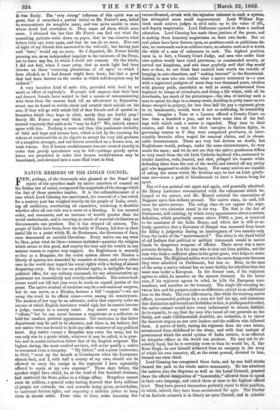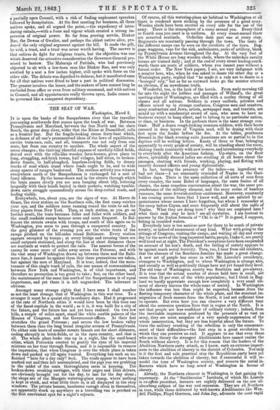NATIVE MEMBERS OF THE INDIAN COUNCIL.
FEW, perhaps, of the thousands who glanced at the limes' brief report of the speeches made by native members of council on the Indian law of entail, recognized the magnitude of the change which the fact of those speeches implies. It is the enfranchisement of a race which Lord Canning has sanctioned, the removal of a ban which for a century past has weighed heavily on the people of India, crush- ing all ambitions, smothering all capacities, rendering it doubtful whether after all our rule was a curse or a blessing. It has secured order, and commerce, and an increase of wealth greater than .the world understands, and is securing as much of material civilization as Governments can produce. But it has stopped all careers. The people of India have been, from the battle of Plassey, left free in their social life to a point which M. de Rochussen, the Governor of Java, once denounced as suicidal liberalism. Every native can say what he likes, print what he likes—treason included—practise the religion which seems to him good, and employ his time and his wealth in any manner reason or caprice may suggest. An Englishman is scarcely so free as a Bengalee, for the social system allows the Hindoo a liberty of opinion not conceded by manners at home, and every other race in the world may regard his social rights with a feeling of almost despairing envy. But he has no political rights, is ineligible for any political office, for any military command, for any administrative ap- pointment not immediately and strictly subordinate. The native land- owner could not till last year even be made an unpaid justice of the peace. The native student of medicine may be a sub-assistant surgeon, but he can never, as a Hindoo, become a full "surgeon"—we are using the word in its official sense—even among his countrymen. The student of law may be an advocate, and in that capacity make an income at which English barristers would sigh, but he cannot become a judge, except in a county court. Any native may enter the "offices," but he can never become a magistrate or a collector, or hold the smallest political appointment. The exclusion in this latter department may be said to be absolute, and there is, we believe, but one native who can be said to hold any office whatever of any political trust. Any native except a Bengalee may enter the army, but he can only rise to a grade which, whatever it may be called, is in prac- tice and in social estimation below that of the English sergeant. The highest daring, the most exalted services, will never qualify a native to command even a company. "My father," said a great landowner, in 1855; " went up the breath at Coimbatore when the Europeans shrunk back, and I, with half a county of my own, should not be allowed to carry the ensign in the regiment I have repeatedly offered to equip at My own expense." Three days before, the speaker might have added, he, at the head of five hundred clubmen* had scattered the State police in a village affray. Bengalees cannot even be soldiers, a general order having decreed that forty millions of people are cowards, the said cowards being given, nevertheless, to incessant faction fights, and requiring a military police to keep them in decent order. -Faun tittle to time, some incoming Go- vernor-General, struck with the injustice inherent in such a system, has attempted some small improvement. Lord. William Ben- tinck made natives judges in civil suits up to the value of 501., and deputy magistrates. Lord Dalhousie opened to them a medical education. Lord Canning has made them justices of the peace, and is making them honorary magistrates on their own lands. But no real prizes have been thrown open, no positions such as politicians de- sire, no commands such as soldiers crave, no salaries such as it is worth the while of a man of substance to seek. The highest position open is, in fact, a County Court Judge, and men who under their own system would have ruled provinces, or commanded armies, or carved out kingdoms, and who know perfectly well that they would have so done, do not think that exalted rank worth the trouble of hanging in ante-chambers, and " making interest" in the Secretariat. Indeed, to men who can realize what a native aristocrat is—a man with a registered pedigree of more than two thousand years, swollen with gloomy pride; sacerdotal as well as social, accustomed from boyhood to troops of attendants, and living a life which, with all its drawbacks, has much of the picturesque—the idea of inviting such a man to spend his days in a steamy court, deciding in petty cases on evi- dence steeped in perjury, for less than half the pay a regiment gives to its bandmaster, would, were it not so saddening, be irresistibly comic. Imagine a Vane or a Lennox offered a County Court on less than a hundred a year, and we have some idea of the feel- ings with which such a career is regarded. They turn to their estates, and find a vent for their energies in faction fights, in governing estates as if they were conquered provinces, in inter- minable lawsuits often waged for nominal claims, and in abomi- nable licentiousness. These are very bad devices no doubt, but Englishmen would, perhaps, under the same circumstances, do very much the same; and we do not see that the native gentleman differs so very much from the old Irish Catholic landlord who, sentenced to similar inaction, rode, hunted, and shot, pillaged his tenants while defending them from the rest of the world, and carried off any pretty girl who happened to strike his fancy. Not many natives are capable of acting the scene which Mr. Grattan says he saw an Irish gentle- man act—loose a pack of bloodhounds to hunt a human being for. sport.
The evil was pointed out again and again, and generally admitted. Sir Henry Lawrence remonstrated with the vehemence which be- longed to his nature, and Mr. Mansel resisted the annexation of Nagpore upon this definite ground. The native state„, he said, left room for native careers. The ruling class do not oppose the argu- ment, but two obstacles stand in the way. The first is the Act of Parliament, still existing, by which every appointment above a certain definition, which practically means above 10001. a year, is reserved to the nominees of the India House, and which law is still so ac- tively operative that a Governor of Bengal was censured from home for filling a judgeship daring an interregnum of two months only from the ranks of the " uncovenanted." The other is the fixed belief of old Indians that political or military commands would in native hands be dangerous weapons of offence. Thete never Waa a more peiverse delusion. It is the man who is shut out from politics, not the man Who finds a sufficient place in the great game, who helps to make revolutions. The Highland nobles were not the more dangerous because they were admitted to Parliament, but less so. Even in the case of the army a native colonel has no more facility for rebellion than the sane than under a European. In the formet case, if his tegiinent agrees to rebel, he marches on the nearest treasury. In the latter case, if his regiment agrees to rebel, he kills the European com- mandant, and marches on the treasury. The single life standing be- tween him and his purpose makes no difference, except in an additional loss to the State. The real difference is, that while the existing native officer, commanded perhaps by a man not half his age, and conscious that distinction and reward are forbidden to him, is predisposed to rebel, the native colonel would have every inducement to remain faithful. As to capacity, to say that the men who taxed all our generals on the Sntlej, and made Chillianwallith doubtful, are imbeciles, is to throw the heaviest stigma on our own leaders and the soldiers who followed them. A native of birth, raising his regiment from his own estate, accustomed from childhood to the chase, and with that instinct of government Which the social system of India creates, is as efficient an irregular officer as the world can produce. He may not be ab- solutely loyal, but he is certainly more so than he would be, if, like Hoer Singh, he saw himself debarred from an ensigncy in the army of which his own tenantry, all, as the event proved, devoted to him, formed one clear third.
Lord Canning has recognized these facts, and by one bold stroke cleared the path to the whole native community. He has admitted the natives into the Supreme as well as the Local Council, granted them the official designation of "honourable," allowed them to speak in their own language, and raised them at Once to the highest official level. They have proved themselves perfectly equal to their position, to which, indeed, they have been accustomed for ages. The Durbar of an Eastern monarch is in theory an open Council, and in practice
a partially open Council, with a risk of finding unpleasant speeches followed by decapitation. At the first meeting for business, all three natives spoke, and all argued the point,—the expediency of intro- ducing entails,—with a force and vigour which created a strong im- pression of original power. So far from proving servile, Dinkur RR°, the Dewan of Gwalior, and perhaps the ablest native alive, pro- duced the only original argument against the bill. It made the gift, he said, a trust, and a trust was never worth having. The answer is that natives do fight for religious trusts, but the objection was one which deserved the attentive consideration the Governor-General pro- mised to bestow. The Maharaja of Puttiala, who had previously objected to sit with a low-born man like Dinkur Rao, and was only soothed by a seat a few inches higher, still spoke with force on the other side. The debate was dignified to dulness, but it manifested once for all that -natives were fitted to bear a part in political discussion. The greater involves the lesser, and the makers of laws cannot long be excluded from office or even from military command, and with natives in Council, and all appointments really thrown open, India ceases to be governed like a conquered dependency.































 Previous page
Previous page